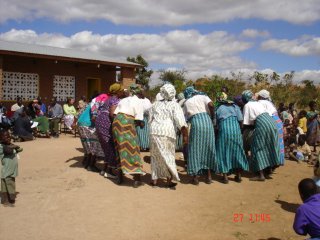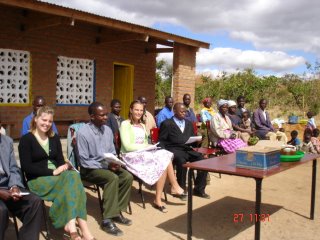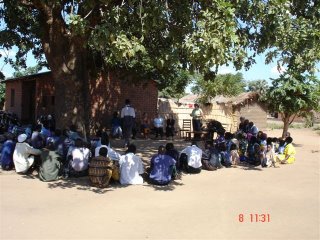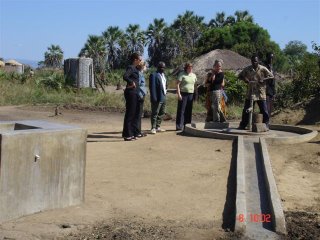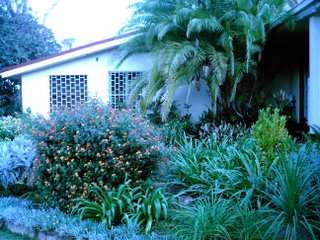Today I...
Tuesday, June 27, 2006
A Busy Day
Today I...
Monday, June 26, 2006
Give Me Pen. I am School.
On the way, we stopped at what I can safely say is my most favorite place in Malawi so far: Mua Mission. It's a small mountain village known for it's beautiful catholic church and cheap woodcarvings. Unfortunately, we missed the turn off the M5 and only realized it after we'd risked our lives crossing The Scariest Wooden Bridge I Have Ever Seen (re: two planks of wood for the car tires laid across the river). So we had to whip around and Risk Our Lives Again.
However, it was so worth it.
Once we got up the steep dirt road, it emptied out into a bustling but serene village of Mua. They've built up quite a tourist industry around the Mission, complete with a lodge, restaurant, waterfall, zoo, museum and woodcarving station. As we stumbled out of the car (still recoving a bit from Friday night), children lined up to greet us with "Hallo! How are you fine!" My favorite was one kid who kept following me saying "Give me pen. I am school."
On the whole, however, the village seemed to be used to seeing mazunga's around, because we were pretty much unmolested (except of course, for my friend School.) and left to poke around the well-off village on our own. Unlike other places in Malawi, Mua is nestled in on a hillside, surrounded by beautiful, shade-giving trees. It was so different from the dusty, shrub-like atmosphere of lower elevations that I almost felt like I was in a fairy-land. That, combined with the rolling of a distant waterfall and twittering of tiny chickadees, left me in kind of a luscious stupor.
At any rate, Brad and Alex were dragged off by some kids to see the "zoo" (one crusty looking alligator, a red-rumped baboon and one very angry monkey) I just kind of stood around and breathed. I must have looked a bit constipated because I woman passed by me to enter her hut and said "The toilets are over there." Her English was superb (that kind of lilting, sing-songy, soothing African English) so I started chatting with her about life in Mua, and then life in general.
Sister Josephine has been living in Mua for four years, studying at the Mission and doing research on staring a village for emotional and spiritual healing. She spoke with such conviction that I was touched. In a place as calm and quiet as Mua, one definitely wanted to envision a peaceful center for healing - where not only the physically ill but the emotionally drained could go to find a drink. We chatted for along while and afterwards, she gave me a hug.
I think it was my first hug since leaving home, actually. I think it was just what I needed.
We soon had to leave to drive the rest of the way to the beach. But Alex and I are committed to coming back on the 4th of July to check out the museum and eat at the yummy looking restaurant.
As far as the rest of the weekend went, it was pretty uneventful. Did some beach sitting, watched "Freddy vs. Jason" at the beach bar, drove home, and slept.
Friday, June 23, 2006
So Random It Doesn't Get Numbered
- The walls are so thin in my office that I can hear everyone (and their annoying cell phone rings) including the Education officer next to me who has a penchant for blaring classical music on his computer speakers. That's actually nice. But the "running off for a meeting and leaving your cell phone to ring incessantly at your desk" thing is getting really old.
- Being annoyed with general annoyances. Lightswitches that are hidden four doorways down, garbage cans that don't exist, cleaning ladies that clean around you while you work (really, must you dust my keypad whilst I'm typing???) people who don't call you back, having to sit in an office all week, general guilt and malaise over development and being mazunga, relying on others for transport everywhere, etc, etc, ad nauseum :(
- Reading about fertilizer. Alot. Meeting with some cool people, trying to make in roads to other cool people. Failing miserably.
- The US losing to Ghana and getting sent home. My American self feels bad. But, on the other hand, my African self is happy that Ghana continues! Hooray!
- Meeting a woman in a refugee camp, running from the DRC, who has been stuck there for three years and is unable to leave because her dentist husband can't find a job.
- French lessons at the small Alliance Francaise here.
- Running/walking/drinking in the HASH.
- Wondering where the heck my Warren posse is on the intranets. Having to miss camping.
- Getting a (free) phone call from an old co-worker/friend after four days of trying to connect.
- Reading Emma's War. Man, what a nutjob she was! They're making a movie out of this?
- If you hadn't have guessed it - they are not kidding when they say that culture shock, if graphed, looks like this.
- Hoping that next week will be better.
M for Mopey,
M.
Monday, June 19, 2006
To Peace Corps or Not To Peace Corps
1) Firsthand development experience, catalyzing sustainable change at the local level.
2) Language experience .
3) Twenty-seven months in a mud hut contemplating my belly button and Other Large Life Questions. (Also, reading as many books as I want).
4) Making amazing connections with people and forming forever friendships.
5) Travel.
7) Losing like, twenty pounds.
6) Wait, don't they get like a $6,000 stipend at the end of it?
Con:
1) Two years of being constantly asked for money while catalyzing change and watching it die a slow and painful death.
2) Language experience in something like Chichewa, Ibo, Ciluba, Shabo, Dahalo which are obviously in high demand once you move back to the suburbs.
2) Twenty-seven months in a mud hut contemplating my belly button and Other Large Life Questions. (Plus, running out of books!)
3) Rabies, scabies, babies and other scary diseases.
4) Having to leave behind amazing connections and forever friendships.
5) Traveler's diarrhea.
6) Eating nsimi, ugali or foufou every day for three years. Blech.
7) Ooo $6,000. That will pay for like, 1/9th of my college loans.
I am obviously too cynical already to do this. What do YOU think? Would YOU join the Peace Corps??
M is for mud hut,
M.
Thursday, June 15, 2006
Public Relations
While there is a lot of poverty in Malawi, after awhile you must cast away your western designs (they live in mud huts! they use outhouses! they don't wear shoes! their clothes are dirty!) and start to discern different gradiations of poverty (they don't have any livestock, their bellies are swollen, their hair is turning red from lack of protein...). It's something I am just beginning to realize and cultivate, as I can see it's a skill highly needed in this line of work if you are to truly help the "poorest of the poor."
After three hours of driving we reached a village that has been in a drought since late February. From my lens, every place in Malawi seems terribly dry - the grass is yellow, the trees are getting brown - even though I am told that this is just the beginning of the dry season and it will get worse until around November. So, I'm not the best person to be taken to assess a drought-ravaged area. Luckily, this task does not (officially) fall to me.
We arrive to look at a small plot of scorched land, the Traditional Authority (TA) of the region is there, as well as the village chief and several men. From the village, a flood of people come streaming down the road ala the Pied Piper of Hamline and coagulate around us. (The kids of course, brush up against us and cast furtive, curious glances to find our eyes behind shaded glasses. They're cute.) One of my colleagues spends a great deal of time asking questions about how long the drought has been, how many families have been affected, if they have cattle, where they get food, what percentage of chidren have stopped going to school, etc etc.
The visiting azungus from Holland openly point camera lenses at children and adults, one even with a tripod and video-recording set up. (I understand the need for PR but come ON.) Later, they hand out balloons to the children (in a drought ravaged field? The fortunate few that figured out how to get theirs blown up watched them pop before their eyes) and pens to the adults (causing a few scuffles).
The leaders answer that about 80% of families are affected, they've sold off their cattle, the men go to neighboring areas to find work to purchase food and almost all the children have stopped going to school since January. The women say they need a hospital, and near the end, a man chimes in that their bore wells are all dry, too. Can you fund that?
I look down at the little girl next to me, and she is gently gnawing at a fist sized cucumber. She tries to give it away to her neighbors, but no one will take it. She takes little nibbles and peers up at me. Later, I am playing with the children and I see a little boy carrying a Chichewa textbook. He teaches me the words bedi (bed), agogo (grandmother), baba (grandfather) and ufi (corn silo).
I'm not doubting that this village has been affected by drought. I'm sure it's going to get much worse for them before it gets better. Now, it's possible that I don't have all the information and I am keeping my mind open.
But in the back of my head I wonder if the villager's aren't doing a bit of PR of their own.
M.
Monday, June 12, 2006
Random Acts #245, #90012, #6, #111....
#90012: Furtive afternoon walks/jogs through your razor-wired community, trying to get exercise (one can't sit at the beach forever) while avoiding packs of feral, rabid dogs. No joke.
#6: Going to the beach. Sitting at a four star resort under an umbrella, staring at a Lake Eerie size puddle, sipping warm coke on a Sunday morning. Now THIS is the day that the Lord has made!
#111: World Cup goodness. Like throwing a flame onto the smoldering tinder of dwindling expat community life - suddenly there are things to do, places to go, parties to attend and lots of beer to drink (ok well those that two are normal). And guess what? I'm finding that I actually LIKE watching soccer (ahem, footie)!
Friday, June 09, 2006
Capital Escape
Yesterday was my first day out of the capital. And while I like Lilongwe, in a country where 85% of the population lives in the rural areas, it's not an accurate representation of the country to stay here all the time. So I was excited to go.
As part of a self-help fund, the Embassy provides small grants (up to $25,000) to various sustainable projects each year. The long term goal is to hand over the project to the village after a year or two (or three, in this case) so that villagers will have a handle on their own destiny, instead of constantly being directed by one agency or another. Yesterday we went out to the village to hand over a shallow well project that had been three years in the making.
We went to the small village of Nkhotakota, on the shores of Lake Malawi. I am continually impressed by the only variable pot-holey-ness of the national road system here, as it only took us two hours to get there with minimal delay (mostly caused by goats). Once we got off the beaten path however, we finally hit the choppy, dusty, bumpy, dirty roads I associate with Africa. It was awesome!
The village itself was quite nice - lots of brick homes spread along the road with thatched rooftops. After a brief inspection of the shallow wells (ten in all were built, only after shoddy equipment, fraud and other delays) and waiting in the sitting room of the chief, we were all escorted outside to the hand over ceremony under the large, central fig tree. Our regional security officer, acting as the Ambassadorial Representative (we affectionately nicknamed her the "Faux Ambo"), was directed to sit on a large recliner they had brought out of the chief's house for her. Alissa and I, plus the contractor, village chief, regional chief and others sat on a bench while everyone else sat around us on the ground (men and women separated of course).
It was fairly awkward, as most of the ceremony was done in Chichewa, the other national language here besides English. However, experience in other languages (ahem, Japanese maybe?) has taught me just to nod and smile. After a brief prayer, the village chief and then his regional chief got up said how much they liked the wells, appreciated the hard work, thanked everyone involved and asked for more money for other projects.
Most of these speeches were very simple, or in Chichewa and then translated very simply, so I feel we didn't get everything, but we got the gist of what was being said. Thank you, now give us more. I wasn't very surprised at this (if the tables were turned I would certainly ask for more money even if I didn't need it!) but I've spoken with several other development professionals who find this kind of reception at the very worst, ungrateful, and at the very least, tactless. I do understand where they're coming from, and it all weaves into an ongoing discussion I've been having with my colleagues here what can only be described as "Development As Help vs Development as Dependency".
Anyway, that's a whole nother post.
After the "handing over" there was supposed to be dancing, and in truth, one dancer did appear. He had a blue conical woven mask with no face (no space to even breathe - it was just like a bag or a dunce's cap over his head) with little tiny bells dangling from it. He had grass anklets on either leg, a grass skirt (oh the cliche, but it's true!) a blue tunic. It all seemed kind of half-hearted - the dancer kept stopping and starting, like Ashley Simpson on SNL. The drummers drummed but weren't in sync. The kids sang a bit in a call and response type, but it never got more than kindling to get going. After about ten minutes of this, the dancer retired and we went to get lunch. I am told that ritual dancing here is quite beautiful (as opposed to when it's not??) but I guess it wasn't our fate this time to see it.
Finally, on to lunch. We drove about 30 km to the shoreline of Lake Malawi to a pottery/restaurant/lake resort called (aptly) Nkhotakota Pottery, where I bought some beautiful pieces (I won't say what or for who, but I've got myself a lovely mug for my morning cup o' joe that has that cute Hippo in the picture on it). I also ate the locally fished chambo, which tasted a bit like walleye, and came highly recommended by the head of my ID program at AU, who lived in Malawi for four years.
Lake Malawi is beautiful - and huge. If you look at a map, it looks like a long, skinny leech. But don't let maps fool you, I was told that it was comparable to the size of Lake Eerie. At some points you cannot see to the other side. Of course, it is a huge tourist destination here - lovely white sandy beaches, cheap scuba diving, kayaking and of course, fishing :) However, the jury is still out for me on whether or not I will swim in it, mostly because it's a) cold and b) full of bilharzia.
Have a lovely weekend.
Cheers from Malawi;
M.
Saturday, June 03, 2006
Thursday, June 01, 2006
Malaweeeeeee!
After waiting and waiting and waiting to get on a plane, I waited another 16 hours (with an agonizing refueling in Dakar where they wouldn't let us get off!) to land in Johannesburg, and then waited another two hours for a two-hour flight to Lilongwe. All totaled, I spent 22 hours traveling (not counting trips to and from the airport). By the time I arrived in Malawi, I was stinky indeed.
But elated. I had arrived!
Lilongwe is a rather sleepy capital. On a scale of one to bustling, it kind of ambles. However, for me, everything is still new, still wonderful. Plus, I'm ready to relax a bit. Africa time = Mtanga time.
Everything is very spread out, and combined with petty theft, driving everywhere is a must. Luckily, we (my roommate and I) have access to a motorpool, that picks us up every morning and drops us off every evening. Although I like being chauffered (who wouldn't?), it does take me back to the days when I had to rely on my dad to drive me everywhere. It makes one very dependent on the availability of drivers, and when they are scarce, a virtual prisoner in your home.
Home, what a great word. The house is terrific! It's big and empty and furnished with government issued items (cheap bedsheets and scratchy towels) and it's awesome. Yesterday I was home when the cable guy arrived (you read right). He also hooked up our phone system; I am able to call the US directly from my house - and if you live in a DC or surrounding area code, I can do it for free! I am just waiting for my HMF to return from his trip.....
We have a gorgeous tropical garden and huge poinsettia plants growing up and down our driveway. Our kitchen does indeed have two large fridges, as well as a washer/dryer and water filter so we can quench ourselves without getting worms (let's here it for no worms!). There are two terraces, an unused dining room, unused bedroom, two bathrooms, a study (which I took over for my research) and two bedrooms (mine is getting the bednet installed today). There is also a large, relatively sparse living room with comfy couches and a tv with a DVD/VHS player.
Not. too. shabby. As I wrote to one of my friends, "Big house with relatively few expenses. This is how all graduate students should live!"
Today is my first day on the job. Was introduced around to everyone and am now left to my own devices in my "own" office (with internet). I am so blown away by it all. I am still amazed that I am even here! When I was introduced to the finance department, I just wanted to give them all hugs - for it was them who found the money for me to come. Thanks guys!
Next on my list: getting ahold of contact lens solution (forgot it!) and lip balm.
More adventures to come,
M.
